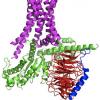A cortisol deficiency can cause sleep dysfunction but cortisol in of itself doesn't do that. At this point it feels like people only want to regurgitate things they read online which clearly doesn't have anything to do with the issues and they have no reason to regurgitate these things because they don't even have anecdotal experiences of them working.
Noradrenaline, dopamine, serotonin and gaba all affect sleep considerably. Dopamine, noradrenaline and serotonin worsen sleep, except serotonin can both improve sleep and worsen it. Gaba improves the ability to fall asleep, stay asleep and have good sleep quality, gaba-a and gaba-b both. Gaba also decreases the need for sleep by improving sleep quality so even after less sleep you feel more rested.
There are also other neurotransmitters that affect sleep, obviously, but they do so mainly via these 4 neurotransmitters. If you want to you can even further reduce them down to fundamentally only 1 or 2 neurotransmitters.
The 5HT1A autoreceptor affects gaba release and thus can improve sleep. The 5HT2A receptor, whatever its mechanism is, decreases sleep quality in every way possible, so you wake up too early, you cannot fall asleep, and the sleep you do get is of poor quality.
Yes hormones can affect sleep, such as a deficiency in inhibitory, androgenic hormones, progesterone, estrogen, etc., but the deficiency needs to be severe and in the end all hormones act on hormone receptors to affect neurotransmitter release, activation and breakdown. Thus it makes much more sense to just focus on neurotransmitters.



























































